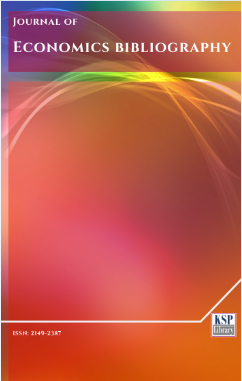On Behavioral Macroeconomics, Globalization, and Economic Growth
Abstract
Abstract. We assess theoretically the effect of forming a free trade union on the total production of a nation, where such effects are caused by the absorption of technologies through different channels. A popular metaphor describes the people as crabs in a bucket because when one crab tries to scape, the others pull it down avoiding a possible way out for all of them. Given this knowledge, posteriorly and independently of the income inequality levels, we extend our analyses to consider the effect of envy in a macroeconomic level on the total production, and draw the implications which this phenomenon has on the formation of free trade unions. We make strategic policy recommendations to allow the achievement of a globalization that benefits each member nation, where we show that the great trade union might have to start in certain order, with gradual and charitable subregional agreements, seasoned with education promotion and possibly a non restricted ideas employment.
Keywords. Trade agreements, Behavioral Macroeconomics, Economic Growth, Policy Design.
JEL. F13, F15, F62, O24.
Keywords
References
Accinelli, E., Brida, J.G., & London, S. (2007). Crecimiento económico y trampas de pobreza: ¿cuál es el papel del capital humano?. Investigación Económica, LXVI(261), 97-118.
Accinelli, E., London, S., Punzo, L.F., & Carrera, E.S., (2010). Dynamic complementarities, efficiency and Nash Equilibria for populations of firms and workers. Journal of Economics and Econometrics, 53(1), 90-110.
Accinelli, E., & Carrera, E.S. (2012). Corruption driven by imitative behavior. Economics Letters, 117(1), 84-87. doi. 10.1016/j.econlet.2012.04.092
Barreira, S.R., Laurelle, A., & Zuazo, P., (2011). Replicator Dynamics and Evolutionary Stable Strategies in Heterogeneous Games. Working Paper 11/54, University of Leicester.
BBC News, (2016). Brexit: All you need to know about the UK leaving the EU. [Retrieved from].
Bowles, S., (2006). Microeconomics: Behavior, Institutions, and Evolution. New York: Princeton University Press.
Durlauf, S.N., (2003). The convergence hypothesis after 10 years. Working Papers, No.6, Wisconsin Madison - Social Systems.
Grossman, G.M., & Helpman, E. (1990). Trade Knowledge Spillovers and Growth. NBER Working Paper, No. 3485. doi. 10.3386/w3485
Howitt, P., & Mayer-Foulkes, D., (2005). R&D, Implementation and Sagnation: A Schumpeterian Theory of Convergence Clubs. Journal of Money, Credit and Banking, 37(1), 147-177.
Kilic, C. (2015). Effects of globalization on economic growth: Panel data analysis for developing countries. Economic Insights – Trends and Challenges, 10(1), 1-11.
Lal, D., & Rajapatirana, S. (1987). Foreign trade regimes and economic growth in developing countries. The World Bank Research Observer, 2(2), 189-217.
Madsen, J.B. (2009). Trade barriers, openness, and economic growth. Southern Economic Journal, 76(2), 397-418. doi. 10.4284/sej.2009.76.2.397
Pagano, U. (2007). Cultural globalisation, institutional diversity and the unequal accumulation of intellectual capital, Cambridge Journal of Economics, 31(5), 649-667. doi. 10.1093/cje/bem015
Pagano, U. (2011). Interlocking complementarities and institutional change. Journal of Institutional Economics, 7(3), 373-392. doi. 10.1017/S1744137410000433
Rodrik, D., Subramanian, A., & Trebbi, F. (2004). Institutions rule: The primacy of institutions over geography and integration in economic development. Journal of Economic Growth, 9(2), 131-165. doi. 10.1023/B:JOEG.0000031425.72248.85
Sánchez-Carrera, E.J. (2012). Imitation and evolutionary stability of poverty traps. Journal of Bioeconomics, 14(1), 1-20. doi. 10.1007/s10818-011-9114-0
Solow, R.M. (1956). A contribution to the theory of economic growth. Quarterly Journal of Economics, 70(1), 65-94. doi. 10.2307/1884513
Vamvakidis, A. (1998). Regional integration and economic growth. The World Bank Economic Review, 12(2), 251-270.
DOI: http://dx.doi.org/10.1453/jeb.v3i3.991
Refbacks
- There are currently no refbacks.
.......................................................................................................................................................................................................................................................................................................................................
Journal of Economics Bibliography - J. Econ. Bib. - JEB - www.kspjournals.org
ISSN: 2149-2387.
Editor: jeb@ksplibrary.org Secretarial: secretarial@ksplibrary.org Istanbul - Turkey.
Copyright © KSP Library

